AI fever has loosened its grip on the stock market.
Gone is the first half of 2024, when investors’ passion for artificial intelligence drove the market skyward even as stubbornly high inflation dashed hopes that the Federal Reserve would begin cutting interest rates.
Most Read from The Wall Street Journal
The third quarter brought a new order to markets. Investors began to look askance at big tech companies’ heavy spending on AI. They took heart in a series of tamer inflation readings that led the Fed to finally lower rates. And many, seeing signs of economic strength, grew confident that the central bank had managed to control price pressures without driving the U.S. into recession.
It was a recipe for the broadening of a rally that many investors worried had grown precariously reliant on a few big tech stocks.
In the third quarter, broad swaths of the market, from utilities to industrials to financials, trounced the powerful technology sector. Value stocks beat growth stocks. Small-capitalization stocks emerged from their torpor to leave their large-cap peers in the dust.
Fatigue among the big tech stocks tends to weigh on the S&P 500, which gives greater influence to companies with large market values. But gains by a wide range of other stocks helped push major indexes higher. The U.S. large-cap benchmark advanced 5.5% for the quarter, bringing its 2024 gains to 21%. That was its best performance in the first three quarters of a year since 1997, according to Dow Jones Market Data.
Many investors think the economy looks healthy enough for stocks from a variety of industries to continue to run, potentially contributing to a more sustainable rally.
“It really does appear as though the Fed is pulling off a soft landing,” said Ellen Hazen, chief market strategist and portfolio manager at F.L.Putnam Investment Management. “We do think the broadening of the market beyond the Magnificent Seven is likely to continue.”
F.L.Putnam recently bought shares of industrial company Trane Technologies, believing the stock will do well if the economy avoids recession, Hazen said.
The big tech stocks in the Magnificent Seven went their own ways in the quarter. Nvidia, the chip maker at the heart of the AI boom, pulled back after its torrid advance in the first half, along with shares of Alphabet, Microsoft and Amazon.com. Apple, Meta Platforms and Tesla, meanwhile, ended higher.
Their near-uniform march upward was interrupted as investors questioned the vast amounts of money some companies are committing to their AI pursuits.
In recent months, Alphabet reported slowing growth in advertising sales at Google along with a near-doubling of capital expenditures from a year earlier, while Amazon forecast weaker-than-anticipated sales growth and said it would boost spending to meet demand for AI services. The stocks declined 8.9% and 3.6% for the quarter, respectively.
“The narrative switched around to, ‘Are they going to make money with all this spending?’” said Jim Polk, head of equity investments at Homestead Advisers. “We believe there’s still a real story there and AI is going to happen, but certainly it got ahead of itself.”
Bond investors enjoyed a rally, too, as the Fed’s rate cuts finally began. The yield on the benchmark 10-year U.S. Treasury note, which falls when prices rise, dropped to 3.798% from 4.342% at the end of June, snapping a two-quarter streak of rising yields.
Declining rates have helped boost corners of the stock market that are often thought of as bond proxies because of their hearty dividend payments. The utilities sector ended the quarter as the S&P 500’s top performer with a 18% gain, while the real-estate group climbed 16%.
The quarter held another intriguing development in government bonds. Two-year U.S. Treasurys had been trading at a higher yield than 10-year notes, a phenomenon known as an inverted yield curve that has been a classic recession signal, since July 2022. Then earlier this month, the inversion disappeared, as the longer-term Treasury’s yield finally climbed back above that of the shorter-term note.
An inverted yield curve sometimes returns to normal just ahead of a recession, as traders bet on aggressive rate cuts from the Fed. But many investors are optimistic that this time, a recession isn’t in the offing. More than half of respondents to Bank of America’s September global fund-manager survey said they didn’t expect a U.S. recession in the next 18 months.
Data recently showed that inflation cooled for a fifth consecutive month in August, hitting a new three-year low. U.S. job growth, meanwhile, rebounded from lower levels that had sparked fears of a slowdown. Consumer sentiment is improving, and households are continuing to spend.
To be sure, not everyone thinks the economic picture is rosy.
The unemployment rate has ticked up this year, and there are signs that lower-income consumers are struggling to pay their bills. Dollar General, the country’s largest dollar-store operator, cited economic strain on its customers, among other factors, as it slashed its sales outlook in late August. Restaurant chains have been rolling out deals and discounts to lure back customers tired of rising menu prices.
Josh Emanuel, chief investment officer at Wilshire, saw an acknowledgment of “some real economic deterioration” in the Fed’s decision in September to cut rates half a percentage point rather than the typical quarter-point.
“You haven’t seen equities really price in enough of that deterioration in growth yet,” he said.
Write to Karen Langley at karen.langley@wsj.com
Most Read from The Wall Street Journal
Read the full article here

